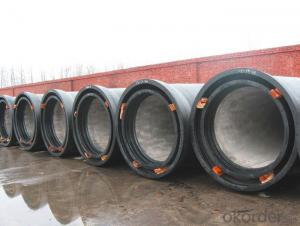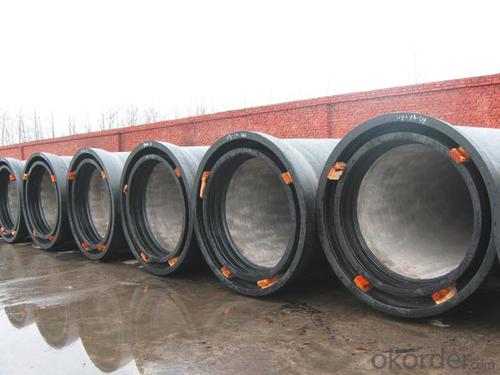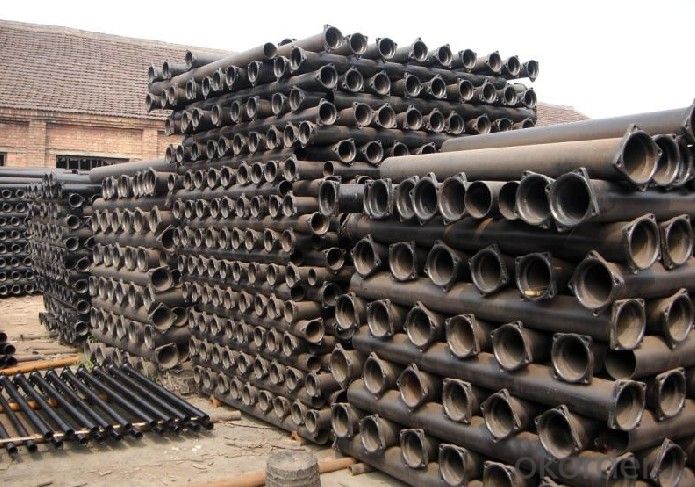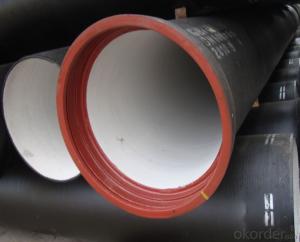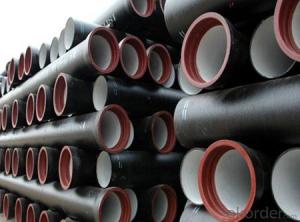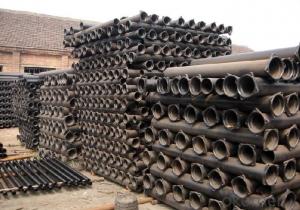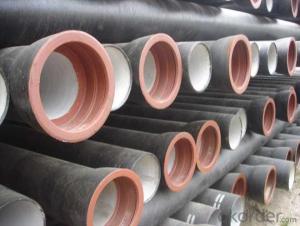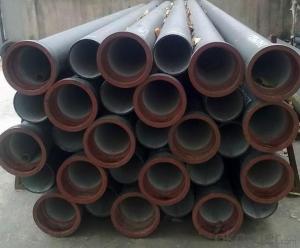Ductile Iron Pipe EN598 DN100-DN700 K9 Top Supplier in China
- Loading Port:
- China main port
- Payment Terms:
- TT or LC
- Min Order Qty:
- 20 m.t.
- Supply Capability:
- 200000 m.t./month
OKorder Service Pledge
OKorder Financial Service
You Might Also Like
1. Ductile Iron Pipe Description :
DI pipe fittings are manufactured according to ISO 2531 or BS EN545 or BS4772 FOR POTABLE WATER ,internal is cement lining or wet epoxy coating;External is zinc plus bitumen or wet epoxy coating. We also manufacture ductile iron fittings with fusion bonded epoxy both inside and outside. All the producets are sutible to water pipes fields.We have passed ISO9001,ISO14001,OHSMS18001 certificate.
2. Main Features of the Ductile Iron Pipe:
2. Standard: ISO 2531, EN545, EN598, ANSI, AWWA
3. Certificate: ISO9001, ISO14001, SGS, NSF, WRAS
4. Test: In accordance with ISO 2531 / EN 545 / EN598 and 100% water pressure test
5. Length: 6m or cut into 5.6m, 5.7m, 5.8m
6. Internal Lining: Cement, conform to ISO4179
7. External coating: Zinc + Bitumen, conform to ISO8179
8. Rubber: NBR, SBR, EPDM according to ISO4633 / EN681.1
9. Note: The gaskets, bolts & nuts are supplied respectively as your special requirement
3. Ductile Iron Pipe Images:
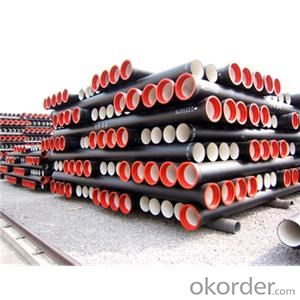
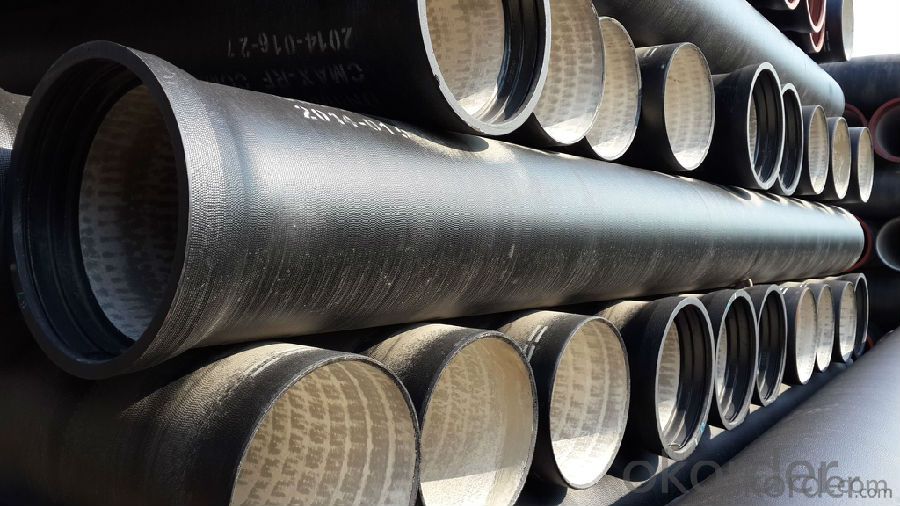
4. Ductile Iron Pipe Specification:
Grade: A53 Grades A/B, ASTM A106 Grades B/C,ASTM A179
AWWA, C200, ASTM A139, ASTM A120, API 5L Grade B
X42, X52, X56, X60, X65, X70, X80, X100
Weld Alternatives: LSAW
OD size range: 6.4~44.5mm
Wall thickness: 406.4~1422mm
Length: 3 - 12 m according to requirment
Note: Other grade can also be provided after consulting. Special design are available
for coal slurry conveyance LSAW line tube
5. FAQ:
We have organized several common questions for our clients,may help you sincerely:
1.Q: Why would you choose ductile iron pipe rather than other pipe materials?
A:The reasons are obvious for that not only ductile iron pipe possesses the inherent strength and flexibility of ductile iron, combined with proven corrosion protection systems, but also the cost savings can be achieved from design to installation and commissioning.
2.Q:Why can you guarantee the inner of pipes can’t be corroded?
A: High alumina cement mortar lining and sulphate-resistant cement mortar lining. These two special linings are applicable to inner anti-corrosion for sewage pipes, improving resistance to erosion of the sewage components.
- Q: How does ductile iron pipe perform in high-pressure gas applications?
- Ductile iron pipe is an excellent choice for high-pressure gas applications due to its unique characteristics and properties. Firstly, ductile iron pipe is known for its high tensile strength, which allows it to withstand the high pressure exerted by gas flowing through the pipeline. This strength ensures that the pipe can safely contain the gas without any leakage or rupture. Moreover, ductile iron pipe has a high resistance to corrosion, making it suitable for gas applications where the pipeline may come into contact with moisture, chemicals, or other corrosive substances. This resistance to corrosion ensures the longevity of the pipe and minimizes the risk of any damages or failures that could be caused by corrosion. Another advantage of ductile iron pipe in high-pressure gas applications is its ability to handle thermal expansion and contraction. When gas is transported at high pressures, there can be significant temperature variations, leading to expansion and contraction of the pipeline. Ductile iron pipe's flexibility allows it to accommodate these changes without causing any structural issues or compromising its performance. Furthermore, ductile iron pipe has a smooth interior surface, which reduces friction losses and pressure drops, allowing for efficient gas flow. This smoothness also minimizes the chances of gas impurities or debris getting trapped, which could potentially cause blockages or flow disruptions. In summary, ductile iron pipe is a reliable and durable choice for high-pressure gas applications. Its high tensile strength, corrosion resistance, ability to handle thermal expansion, and smooth interior surface all contribute to its excellent performance in such demanding conditions.
- Q: What is the minimum pipe diameter of cast iron pipe?
- Cast iron pipe: cast pipe made of cast iron. Cast iron pipes are used for water supply, drainage and gas transmission lines. They include cast iron pipes and pipe fittings. Labor intensity is small.
- Q: Can ductile iron pipes be used for railway bridges?
- Yes, ductile iron pipes can be used for railway bridges. They are commonly used in bridge construction due to their high strength, durability, and resistance to corrosion. Additionally, ductile iron pipes can withstand heavy loads and provide excellent structural support, making them suitable for railway bridge applications.
- Q: What is the expected fire resistance of ductile iron pipes?
- The fire resistance of ductile iron pipes can vary based on factors such as pipe wall thickness, installation quality, and surrounding conditions. However, in general, ductile iron pipes exhibit high fire resistance due to their durable and heat-resistant composition. Ductile iron is created by adding a small amount of magnesium to cast iron, which enhances its strength and flexibility. This results in ductile iron pipes being less prone to cracking or breaking under high temperatures compared to materials like PVC or HDPE pipes. Regarding fire resistance, ductile iron pipes can endure high temperatures for a prolonged period without significant structural damage. They have undergone testing and have been proven to maintain their integrity in fire situations for 2-4 hours, depending on the specific pipe design and installation. It is important to note that while ductile iron pipes possess high fire resistance, they are not fireproof. In the event of a fire, it is vital to adhere to proper fire safety procedures and seek advice from professionals to ensure the safety of the system and surrounding infrastructure.
- Q: Can ductile iron pipe be used for underground fire protection systems?
- Yes, ductile iron pipe can be used for underground fire protection systems. Ductile iron pipe is a durable and reliable material that is commonly used in various applications, including water and wastewater systems, as well as fire protection systems. It has excellent strength, corrosion resistance, and longevity, making it suitable for underground installations. When it comes to fire protection systems, ductile iron pipe can effectively handle high-pressure water flow and withstand extreme conditions, making it an ideal choice for underground installations. It is capable of withstanding the intense heat and pressure that may occur during a fire event. Additionally, ductile iron pipe is available in various sizes and configurations, allowing for flexibility in design and installation. It is also compatible with different types of fittings and accessories, making it easy to connect to other components of the fire protection system. Overall, ductile iron pipe is a reliable and durable choice for underground fire protection systems, providing the necessary strength and longevity to ensure the safety of the premises and its occupants.
- Q: What are the different methods for tapping ductile iron pipe?
- There are several different methods for tapping ductile iron pipe, depending on the specific requirements of the project. Some of the common methods used include: 1. Mechanical Tapping: This method involves using a mechanical tapping machine to create a hole in the ductile iron pipe. The machine is equipped with a cutting tool that rotates and cuts through the pipe wall, creating a clean hole. This method is commonly used for smaller diameter pipes and is relatively quick and efficient. 2. Hot Tapping: Hot tapping involves creating a hole in a pressurized ductile iron pipe while it is still in service. This method requires specialized equipment and expertise to ensure safety and maintain the integrity of the pipe. Hot tapping is commonly used when it is not feasible or practical to shut down the pipeline for maintenance or repair work. 3. Electrofusion Tapping: Electrofusion tapping is a method that uses an electrofusion saddle and fitting to create a branch connection on a ductile iron pipe. This method involves welding a fitting onto the pipe using an electrofusion machine, which creates a secure and leak-proof connection. Electrofusion tapping is commonly used for larger diameter pipes and is suitable for both water and gas applications. 4. Saddle Tapping: Saddle tapping involves attaching a saddle or clamp onto the ductile iron pipe and drilling a hole through the saddle into the pipe. The saddle is then equipped with a threaded outlet for connecting a branch line. This method is commonly used for smaller diameter pipes and is relatively simple and cost-effective. 5. Split Sleeve Tapping: Split sleeve tapping is a method that involves cutting a section out of the ductile iron pipe and installing a split sleeve over the cut. The split sleeve is then bolted together, creating a secure and watertight connection. This method is commonly used for larger diameter pipes and is suitable for both water and gas applications. It is important to note that the selection of the tapping method should be based on factors such as the pipe size, pressure rating, required branch connection, and the specific requirements of the project. Consulting with a professional engineer or tapping specialist is recommended to ensure the proper method is used for tapping ductile iron pipe.
- Q: What is the expected cyclic fatigue life of ductile iron pipes?
- Various factors such as material composition, pipe design, loading conditions, and environmental factors can affect the expected cyclic fatigue life of ductile iron pipes. However, ductile iron pipes are widely recognized for their exceptional ability to withstand fatigue. Ductile iron pipes are specifically engineered to endure cyclic loading, which is common in water distribution and sewer systems due to fluctuating pressures and vibrations. These pipes possess a unique microstructure that confers high strength and ductility, enabling them to resist crack formation and growth under cyclic loading. Numerous studies and industry standards have provided estimates for the expected cyclic fatigue life of ductile iron pipes. For instance, the American Water Works Association (AWWA) C151 standard recommends a design life of 100 years for ductile iron pipes used in water distribution systems, underscoring their long-term durability and resistance to fatigue. Furthermore, research studies have demonstrated that ductile iron pipes can withstand over 1 million cycles of loading without exhibiting any signs of fatigue failure. The fatigue strength of ductile iron pipes can be further augmented by employing protective coatings or linings to reduce the impact of corrosion and abrasion. Nevertheless, it is important to recognize that various factors, such as manufacturing quality, installation practices, and maintenance procedures, can influence the expected cyclic fatigue life of ductile iron pipes. Regular inspections, appropriate handling, and adherence to recommended installation guidelines can help ensure the longevity and performance of ductile iron pipes. In conclusion, while the expected cyclic fatigue life of ductile iron pipes can be subject to variation due to several factors, these pipes are generally renowned for their outstanding fatigue resistance and offer a dependable and enduring solution for water distribution and sewer systems.
- Q: What are the disadvantages of using ductile iron pipes?
- There are several disadvantages associated with using ductile iron pipes in various applications. Firstly, ductile iron pipes tend to be more expensive compared to other types of pipes, such as PVC or HDPE. This can be a significant drawback for projects with budget constraints. Secondly, ductile iron pipes are relatively heavy, which makes transportation and installation more labor-intensive and time-consuming. This can increase the overall cost of the project, especially when considering the need for specialized equipment and a skilled workforce. Another disadvantage is that ductile iron pipes are susceptible to corrosion. Over time, exposure to various environmental factors, such as soil conditions and water chemistry, can lead to the formation of rust and scale on the inner and outer surfaces of the pipe. This can reduce the pipe's lifespan and potentially affect water quality. Furthermore, ductile iron pipes can be prone to cracking or breaking under certain conditions, especially if exposed to heavy loads or significant ground movement. This can result in costly repairs or replacements, leading to additional expenses and disruptions to the water supply. Lastly, ductile iron pipes have a relatively low resistance to impact and abrasion compared to some other materials. This means they may be more prone to damage from external forces, such as construction activities or accidental impacts, which can further increase maintenance and repair costs. Overall, while ductile iron pipes have their advantages, such as high tensile strength and durability, it is important to consider these disadvantages before deciding on their use in a particular project.
- Q: Can ductile iron pipes be used for underground mining applications?
- Yes, ductile iron pipes can be used for underground mining applications. Ductile iron is a strong and durable material that can withstand the harsh conditions and heavy loads associated with mining operations. It has excellent resistance to corrosion and is able to handle high pressure and temperature environments. Additionally, ductile iron pipes are flexible and can be easily installed and maintained, making them suitable for underground mining applications where mobility and adaptability are important. Overall, ductile iron pipes are a reliable and cost-effective choice for underground mining operations.
- Q: Can ductile iron pipes be used for underground fire protection systems?
- Yes, ductile iron pipes can be used for underground fire protection systems. Ductile iron pipes have excellent strength and durability, making them suitable for withstanding the high pressure and temperature conditions that may occur during a fire. Additionally, ductile iron pipes have a high resistance to corrosion, which is important for long-term use underground. They also provide excellent flow characteristics, ensuring that water can be quickly and efficiently delivered to extinguish fires. Overall, ductile iron pipes are a reliable and effective choice for underground fire protection systems.
Send your message to us
Ductile Iron Pipe EN598 DN100-DN700 K9 Top Supplier in China
- Loading Port:
- China main port
- Payment Terms:
- TT or LC
- Min Order Qty:
- 20 m.t.
- Supply Capability:
- 200000 m.t./month
OKorder Service Pledge
OKorder Financial Service
Similar products
Hot products
Hot Searches
Related keywords
